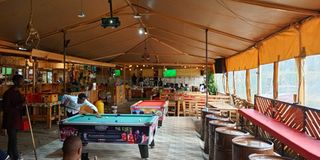The rise and rise of neighborhood pubs and lounges in Nakuru

Hide Out Lounge in Nakuru.
A few years ago, if you told a partygoer that 'kupiga sherehe' would no longer involve a long trip to the CBD, but would instead be just a few steps from their home, they would probably have laughed in your face.
Simply because back then clubs were located in certain areas. In Nakuru, for example, the most popular clubs and lounges were in town. However, this phenomenon is slowly changing thanks to the mushrooming of various entertainment venues in the estates.
It all started during the first wave of the Covid-19 pandemic when movement was restricted. With nowhere to go, homes were turned into drinking dens until business-minded individuals saw the opportunity to open up entertainment venues in estates.
And even after things returned to normal and restrictions were lifted, the revelers continued to flock to their localities. For some, this has been a lifesaver as most people in Nakuru do not live near the CBD and why would you leave home and go to an establishment far from home only to have to travel a long way back just to have fun.
One such establishment that started to fill a need in a particular estate is the Hide Out Lounge. The Hide Out Lounge came to the rescue of those who wanted to relax during the Covid-19 period.
Hide Out Lounge's Marketing Manager, Giggx The Entertainer, said that business has been steadily increasing since the venue opened three years ago.
"The Hideout started off as a local venue for people from the surrounding areas, Kabarak, Kiamunyi, Olive Inn and most of our clientele are usually from these areas and with the way we are usually packed from Friday to the weekend, I believe this trend is slowly taking shape," he said.

Hide Out Lounge in Nakuru.
Across town in the leafy suburbs of Milimani, The Little Gardens is reading from the same script as The Hide Out. Little Garden's director, Mike Mabeya, says The Little Gardens was opened towards the end of the pandemic.

Little Gardens Lounge in Nakuru.
"If you have noticed most people nowadays do not like to be in the city and they prefer to party outside the CBD because of the hustle and bustle and traffic jams and for these reasons people would mostly prefer to relax in places that are close to their homes. So we decided to open this place outside the CBD," he said.
Mtaa Wangu also spoke to Jane Wangari, who lives in Milimani. She says she chooses to go to a club near her home for security reasons.
"Since I don't have a car, I used to have to go into town to have a good time, and the security issue was also very sensitive as I would be returning home late at night. Nowadays, I prefer to go to places that are close to my home and also there you get to hang out with people who live in your area and in a way you feel more welcome and it gives you a sense of security," she said.
Allan Korir - a reveller we found in one of the clubs - says the new trend of entertainment venues being close to the people is very encouraging.
"In Nakuru, most entertainment venues are in town, but nowadays it is very difficult for people to go to town just for entertainment and it is also more expensive in terms of logistics. In places like Nairobi, you would rarely find people going to clubs in town just because of the distance, for example, people who live in Kilimani would go to clubs in those areas as well as those in Kileleshwa and Westlands and many more," said Mr Korir.
"When a pub or lounge opens in a local area, people get jobs and you will find that the boda boda people, taxis and those who sell street food get jobs serving those who patronise these places, so in the end it's a win-win situation for everyone," he said.
